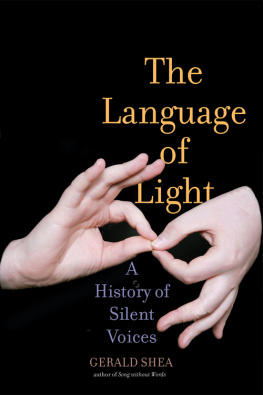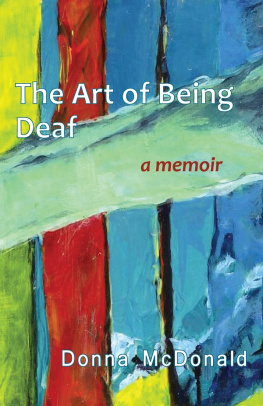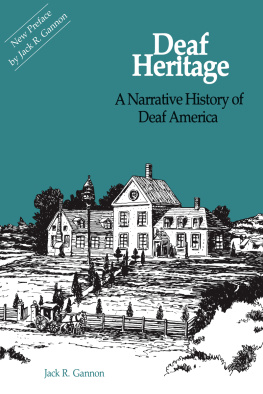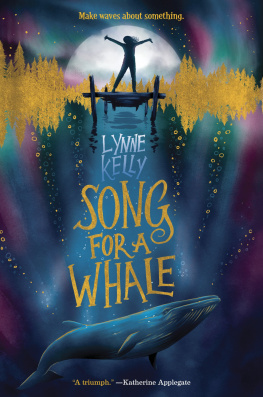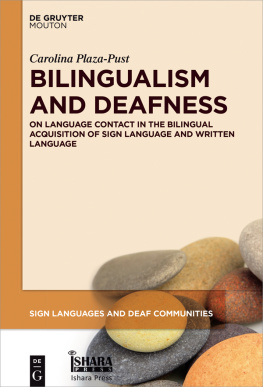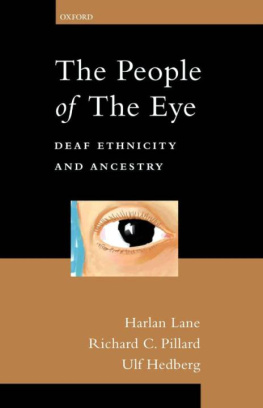SONG
WITHOUT
WORDS
SONG
WITHOUT
WORDS
Discovering My Deafness
Halfway through Life
GERALD SHEA

A Merloyd Lawrence Book
DA CAPO PRESS
A Member of the Perseus Books Group
Copyright 2013 by Gerald Shea
All rights reserved. No part of this publication may be reproduced, stored in a retrieval system, or transmitted, in any form or by any means, electronic, mechanical, photocopying, recording, or otherwise, without the prior written permission of the publisher. Printed in the United States of America. For information, address Da Capo Press, 44 Farnsworth Street, 3rd Floor, Boston, MA 02210.
All translations of works quoted from the French are by the author.
Library of Congress Cataloging-in-Publication Data
Shea, Gerald, 1942
Song without words : discovering my deafness
halfway through life / Gerald Shea.
pages cm
A Merloyd Lawrence Book.
Includes index.
ISBN 978-0-306-82194-3 (e-book)
1. Shea, Gerald, 1942 2. DeafUnited StatesBiography.
3. Deaf lawyersUnited StatesBiography. I. Title.
HV2534.S.S54A3 2013
362.4'2092dc23
[B]
2012042840
Published as a Merloyd Lawrence Book by Da Capo Press
A Member of the Perseus Books Group
www.dacapopress.com
Da Capo Press books are available at special discounts for bulk purchases in the U.S. by corporations, institutions, and other organizations. For more information, please contact the Special Markets Department at the Perseus Books Group, 2300 Chestnut Street, Suite 200, Philadelphia, PA 19103, or call (800) 810-4145, ext. 5000, or e-mail .
10 9 8 7 6 5 4 3 2 1
FOR CLAIRE
Je ne marche pas seul... et la route est
moins longue en la faisant deux.
FERDINAND BERTHIER
The most beautiful privilege of man is undoubtedly his ability to communicate his thoughts and feelings. This precious faculty forms the gentlest knot of society, enabling souls to touch and hearts to mingle. Our joys would soon decay and die within us if we could no longer convey to the bosom of a friend the emotions that stir within our own. A pleasure shared is sweeter, a sorrow lighter. Tears of compassion flow through the heart of the unfortunate like a balm that heals its wounds, just as they soothe the cares of those who shed them. This commerce of souls is for all of us more than a simple pleasure; it is a necessity. Sever the links that bind man to man, and his life is no longer a gift from heaven; it becomes an almost unbearable burden. Without memory, without hope, his existence is linked neither to past nor to future, and comes to a standstill with the needs of each moment, filled with anxiety and sorrow.
Roch-Ambroise Auguste Bbian,
In Praise of the Abb de lpe, 1819
A light breeze sprang up and set the reeds and bulrushes rustling. Rat, who was in the stern of the boat while Mole sculled, sat up suddenly and listened with passionate intentness. Its gone! So beautiful and strange and new! Since it was to end so soon, I almost wish I had never heard it. For it has roused a longing in me that is pain, and nothing seems worthwhile but just to hear that sound once more and go on listening to it forever. No! There it is again! O, Mole, the beauty of it! The merry bubble and joy, the thin, clear happy call of the distant piping! Such music I never dreamed of, and the call in it is stronger even than the music is sweet! Row on, Mole, row! For the music and the call must be for us.
Kenneth Grahame,
The Wind in the Willows, 1908
By ordering me to spare my hearing as much as possible, my intelligent doctor almost fell in with my own present frame of mind, though sometimes I ran counter to it by yielding to my desire for companionship. But what a humiliation for me when someone standing next to me heard a flute in the distance and I heard nothing, or someone heard a shepherd singing and again I heard nothing. Such incidents drove me almost to despair; a little more of that and I would have ended my lifeit was only my art that held me back.
Ludwig von Beethoven, age thirty-one,
Heiligenstadt Testament, 1802
CONTENTS
SONG
WITHOUT
WORDS
I N THE BEGINNING I HEARD THEIR VOICES WITH clarity. The days of my early childhood are distant now, but the comfort of the words of those I loved is engraved in my memory. We had just bought a large house on top of a hill in Riverdale, north of Manhattan. I remember the singing in the garden, so many birds, music instead of the early morning horns and sirens that had breached the walls and windows of our apartment in the city. I heard the birds that morning too, outside my window, urging me to stay home from school and listen all day. I was six years old. I woke up tired and, in spite of the music, did not want to venture out nor to make the long walk down the hill. I pretended to be sick. The family doctor came and announced that the boy has the chicken poxId fooled him! He returned a day later and said, The boy has scarlet fever.
In fact, I had both, and the next fourteen days were a battleground of fever and infection, along with an erupting mass of rashes and poxes, mostly red, periodically puffing into large white boils. Every other morning a nurse came, took a needle out of her small black bag, and lanced the latest litter. I was separated from my three brothers and lived in my parents bedroom, while they took the guest room beside it. I still remember the approaching footsteps of Mrs. Pearce, and I imagine her today as the attractive, unassuming nurse who cuts off the thumbs of Willem Dafoe in The English Patientdoh cuh be doh tuh dont cut me. The boils were afraid of her, too, and showed it in a throbbing crescendo as she approached the top step.
My first day up, when I looked in the mirror, the face I saw seemed someone elses; I had to strain to distinguish the eyes, the nose, and the mouth from all the other holes around them, as if the dots were there to be connected to find them. When I went downstairs to breakfast, my father, who had delayed going to work until I appeared, gave me an enormous hug and a kiss on each pitted cheek.
Jack said Mother.
I cant go back to school, Daddy, I said. I dont ever want to go back to school.
Up to that point in my life, my father had been a distant authority, like a judge you had to please for his regard or, if you had broken a window or locked your baby brother in his room, to make a reasoned or at least contrite appeal if you wanted to escape confinement to your bedroom. But to my astonishment he said, smiling, that I would never have to go back to school unless I wanted to. It was the last time he would take me in his arms.
By the end of four more weeks the scars had faded, and I decided to return to school, my father never having raised the question again. What none of us knew was that the real battle had been a covert one, waged in the cochlea, the most complex, sensitive, and vulnerable component of the ear. I had in fact won part of the battle against scarlet fever, for a number of epithelial cells (hair cells) in the cochlea of both of my ears emerged relatively intact. Many other people have lost the fight, recovering only to find themselves profoundly deaf, including Alexander Graham Bells mother; his wife, Mabel; his celebrated protge, Helen Keller; and her precursor in Boston, Laura Bridgman. Illnesses left virtually all of their epithelial cells dead or moribund.
My epithelial cells for some reason managed to remain alive and unaffected in the cochleas winding upper paths, which give us low-frequency sounds. But most consonants and some vowels (ee, ih, ah


